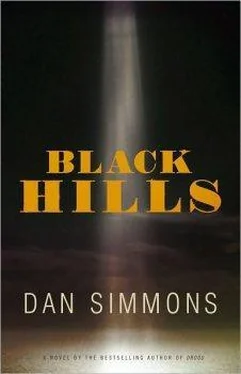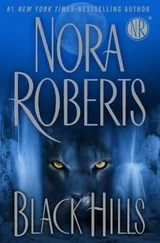Paha Sapa had time only for brief glimpses and scattered impressions—steep hogbacks to his right, warriors and wasichus on horseback there, another long ridge wreathed in smoke and dust ahead to his left, clumps of dismounted wasichus and disorganized bands of warriors shooting at one another there and struggling along the entire grassy stretch that rose toward another, higher ridgeline almost a mile to the northwest. Pulling himself upright, Paha Sapa glanced over his shoulder toward the valley but could not see the circles of a thousand tipis below due to the swirling dust and smoke.
He realized that the band of warriors he was riding with was as disorganized as the other clumps of men he saw scattered all over the hillsides here—his group was mostly Lakota, some Miniconjou, a few Cheyenne. Their leader, a man he had never seen before, looked to be Hunkpapa. The man shouted— Hokahey! —and the band of warriors, followed by Paha Sapa, kicked and whipped their ponies toward groups of bluecoat wasichus firing in dismounted clumps scattered up the hillside to their left. Everywhere in the smoke, wasichu horses and warriors’ ponies were screaming and falling, some shot by their bluecoat owners to provide cover, others being shot out from under their riders or away from the soldiers who held their reins. The rattle of gunfire was constant but underlaid with a rising chorus of screams, cries, grunts, chants, and calls. Women on the hillsides were trilling their shrill tremolos of bloody praise as Paha Sapa followed the others out of the last high shrubs at the top of the ravine.
The next few minutes were largely lost to Paha Sapa’s memory; he had blurred recollections of gunsmoke, jumbled impressions of waves of warriors on horseback flowing over and through and past dismounted wasichus , clouded images of warriors on foot encircling the bands of bluecoats and their dead horses, a nightmare sense of the horses—his mare included—simply stampeding back and forth mindlessly between men who were firing at them. He seemed to recall truly crazy sights, such as the Wasicun soldier galloping away with five Lakota warriors behind him. The soldier was getting away when he suddenly raised his revolver and blew his own brains out. Shocked, the warriors pulled their horses up, looked at one another, and rode south toward louder fighting; they wanted nothing to do with the crazy Wasicun’s corpse.
Paha Sapa clearly remembered that at no point did he try to stop the mare so that he could retrieve a rifle or bow or spear or revolver from any of the dead men that littered the grassy hillside. He could not have stopped the mare if he’d tried. Her lathered sides were flowing with her own blood, and the boy realized that she’d been shot several times with rifle and pistol bullets and that there was an arrow sunk deep in her flesh just behind Paha Sapa’s right leg. With each bound, the mare was snorting up larger gobbets and longer streamers of blood, which flew back and coated Paha Sapa’s neck and chest and face, all but blinding him.
Then the warriors wheeled their horses left like a flock of geese changing course, and Paha Sapa saw that they were charging a band of wasichus that had dismounted on the long hillside below the crest of the ridge. As his mare stumbled forward—certainly she could not live through another charge—Paha Sapa decided that he would count coup. This was the reason he had come up from the village. He had no weapon, not even a knife or a coup stick, so he would have to count coup with his bare hand. Paha Sapa remembers now that he had been grinning wildly, perhaps insanely, when he made that decision.
In the midst of the dead and dying wasichus , a very few bluecoats were kneeling or lying prone or standing and firing. One man with his head bare, short hair, balding—the skin of his forehead so white that for an instant Paha Sapa thought that he had already been scalped—was standing and shooting calmly with a beautiful rifle. A cartridge jammed or he ran out of ammunition as Paha Sapa’s band approached—waves of warriors were riding over and past these and the other dismounted and falling wasichus —and the bluecoat Paha Sapa had noticed now carefully set the rifle down, drew two pistols, and began firing one in his direction.
Paha Sapa’s mare finally went down, her forelegs folding under her, throwing him over her neck and head. Incredibly, impossibly, Paha Sapa hit the ground running and kept running, never falling, almost flying with his dead mare’s speed imparted to his own bounding legs, hurtling almost magically through the dead and dying wasichus as the warriors on horseback raced past on either side, screaming and firing arrows and rifles. Paha Sapa kept his eyes on the tall Wasicun now only twenty strides in front of him. The man saw him, whirled, raised one of the pistols, and was shot.
A bullet had struck the balding Wasicun high in the left chest, knocking him off his feet and backward onto a fallen horse. One of the man’s pistols flew out of sight into the dust cloud, but he held on to the other and raised it, coolly aiming at Paha Sapa’s bloody face as the hurtling, panting boy ran closer, closer.
A racing pony knocked Paha Sapa almost off his feet as the Wasicun fired. Paha Sapa heard the bullet buzz past less than a handswidth from his ear. Then he was upright and bouncing forward again, the Wasicun taking cool and careful aim at him, and at that instant some warrior fired over Paha Sapa’s shoulder, striking the bluecoat in the left temple. The man’s head snapped back, and his beautiful pistol fired harmlessly into the air just as Paha Sapa lunged forward and set his palm and five fingers on the white man’s chest.
And the ghost leaped into him.

WHEN PAHA SAPA STOPS SPEAKING—he has condensed all those remembered details into a very few words—there are grunts and then a long silence. When Sitting Bull finally breaks that silence, he addresses himself to Limps-a-Lot.
— When you return to your village, you must perform a Ghost Owning Ceremony with a very big giveaway.
It is Limps-a-Lot’s turn to grunt. Paha Sapa, ever sensitive to his stepfather’s nuances, knows from this noncommittal noise that the old man does not agree with Sitting Bull that a Ghost Ceremony is the proper response to this spirit-possession.
Long Turd holds out his hand to bring silence and attention.
— We will have to know whether this was Long Hair who sent his ghost into the boy. Black Hills, you saw the man die—do you think it was Long Hair?
— I do not know, Grandfather. The Wasicun had very short hair. I think he was an officer. He did have very beautiful guns, both the rifle and the two pistols. These were gone when I returned to the body.
Foolish Elk cleared his throat, obviously hesitant to speak in the company of the three older holy men.
— It is said that Long Hair carries a rifle with eight sides to the barrel. Did you notice that, Black Hills?
— No. Only that it was very fancy and that it fired faster than the other bluecoats’ carbines.
Paha Sapa pauses.
— I am not a warrior. I am sorry for not observing such things more carefully.
Sitting Bull grunts and waves his hand dismissively.
— No one needs apologize for not being a warrior. You are still a boy and apparently do not wish to become a warrior. You are—and you will become—what Wakan Tanka wishes you to be. No man can change that.
As if embarrassed by saying so much, Sitting Bull sneezes and says—
Читать дальше













